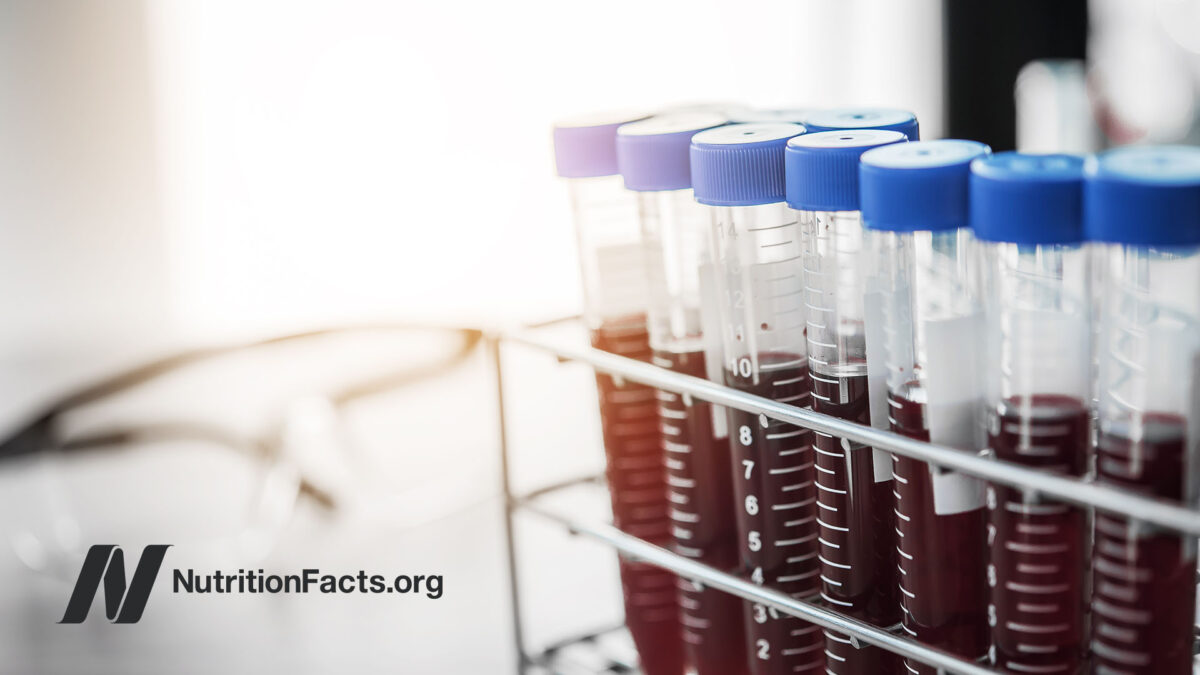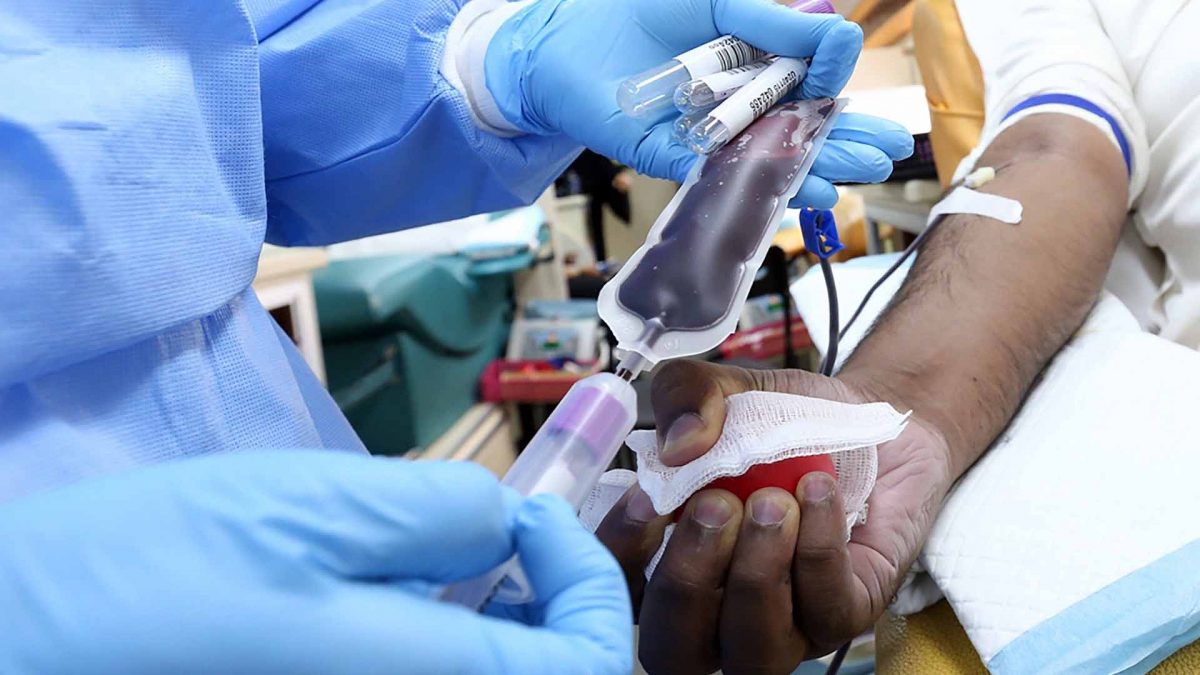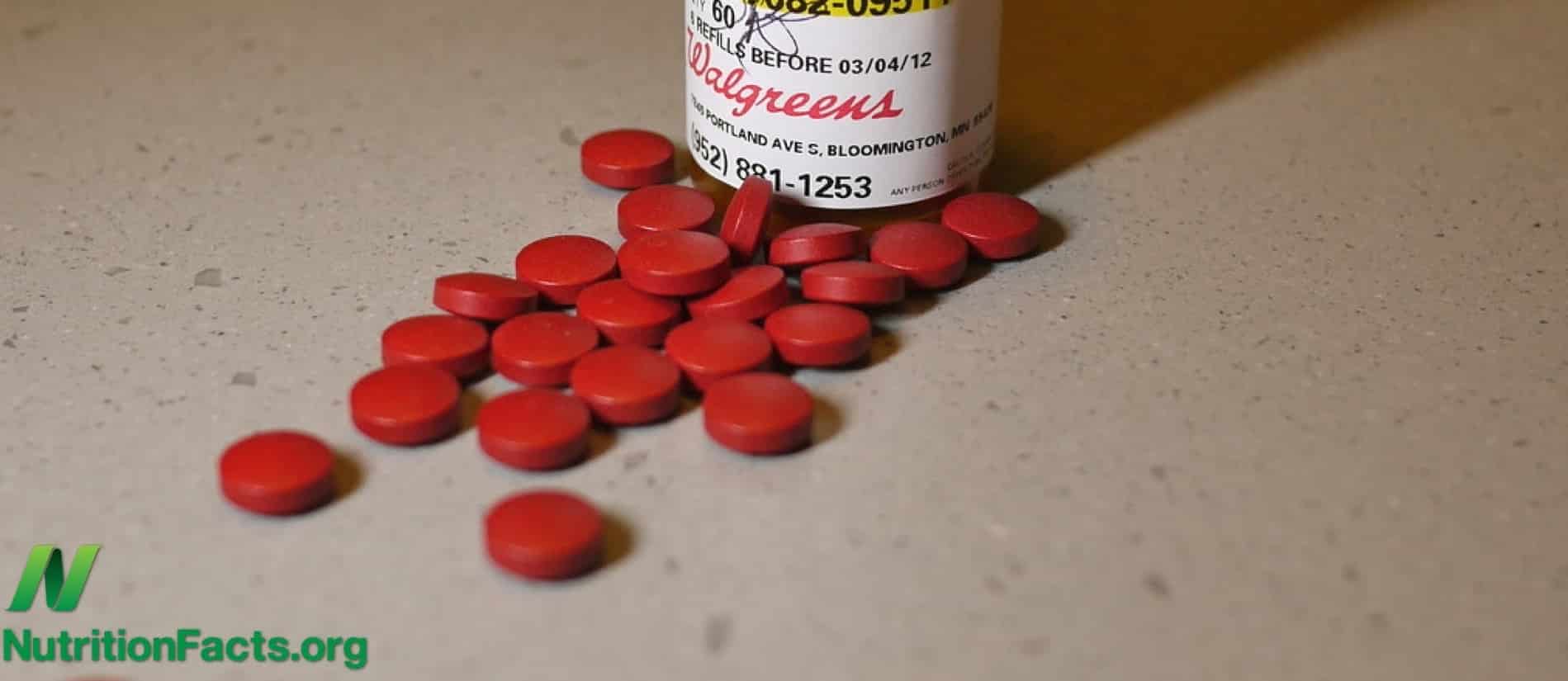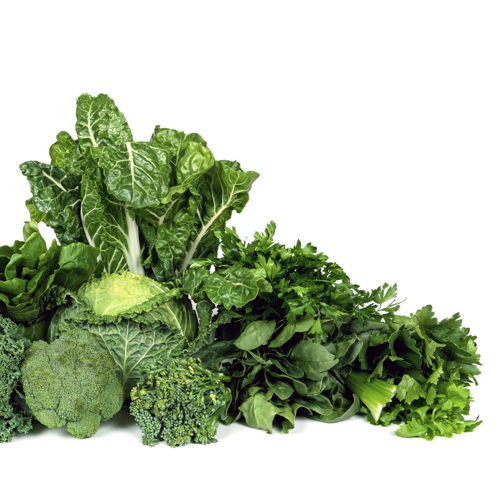
Iron
An important mineral, iron helps maintain blood health. It is a primary component of hemoglobin, a protein in red blood cells that carries oxygen to all parts of the body from the lungs, and part of myoglobin, a protein that transports and stores oxygen in our muscles. Iron is important for childhood brain development and growth, as well as the production and functioning of myriad hormones and cells.
Iron from food comes in two forms: heme and non-heme. Heme iron is found predominantly in blood and muscle, whereas non-heme iron is primarily found in plants, such as whole grains, nuts and seeds, legumes, and leafy greens. We used to think of heme iron as coming exclusively from animal products and non-heme iron as found only in plants, but that isn’t the case. The plant-based Impossible Burger contains heme iron derived from soybean plants, for example, and non-heme iron can be found in meat if the animal had consumed plant foods with non-heme iron.
Compared with people who eat meat, vegetarians tend to consume more iron (and more of most nutrients), but since the iron in plants is not absorbed as efficiently as the heme iron in meat, about 1 in 30 U.S. menstruating women may lose more iron than they take in, which can lead to anemia. Women who eat plant-based diets don’t appear to have higher iron deficiency anemia rates than women eating a lot of meat, but all women of childbearing age should ensure adequate iron intake.
Those diagnosed with iron deficiency should talk with their doctors about first trying to treat it with diet, as iron supplements have been shown to increase oxidative stress. The healthiest iron sources are whole grains, legumes, nuts, seeds, dried fruits, and green, leafy vegetables, which can be paired at the same meal with vitamin C-rich foods such as citrus, bell peppers, broccoli, and tropical fruits to boost iron absorption.
For substantiation of any statements of fact from the peer-reviewed medical literature, please see the associated videos below.
Image Credit: robynmac / Thinkstock. This image has been modified.
Popular Videos for Iron


Donating Blood to Prevent Heart Disease?
An extraordinary thing happened when those at high risk for heart disease were randomized to...
The Safety of Heme vs. Non-Heme Iron
Heme iron, the type found predominantly in blood and muscle, is absorbed better than the...
Risk Associated with Iron Supplements
Iron is a double-edged sword. If we don't absorb enough, we risk anemia; but if...All Videos for Iron
-

The Growth and Nutrient Intakes of Children Raised on Plant-Based Diets
How can we plan well-balanced plant-based diets for infants and kids?
-

Is Soil Degradation Reducing the Nutrition of Fruits and Vegetables?
Is the purported decline of nutrients in our crops due to soil degradation, or is that just supplement industry propaganda?
-

Plant-Based Pregnancy Outcomes and Breast Milk
The composition of breast milk is compared between vegetarian and nonvegetarian women.
-

Does Coffee Inhibit Iron Absorption? What Are the Effects of Having Too Much Iron?
Coffee and common herbal teas impair iron absorption, which may help explain some of their benefits.
-

Potential Vitamin and Mineral Deficiency Risks on a Vegan Diet
What is the best way to get the nutrients of concern on a plant-based diet?
-

Coffee Put to the Test for Treating Parkinson’s Disease
Coffee can improve Parkinson’s symptoms within three weeks compared to placebo, but do the benefits last?
-

Supplements for Hair Growth
Might biotin or zinc supplements prevent hair loss in men and women?
-

The Benefits of Moringa: Is It the Most Nutritious Food?
Does the so-called miracle tree live up to the hype?
-

Studies on Millet Nutrition: Is It a Healthy Grain?
Millet isn’t the name of a specific grain, but a generic term that applies to a number of totally different plants. Which is the most healthful?
-

Is Heme Iron the Reason Meat Is Carcinogenic?
Rectal biopsies taken before and after eating meat determine the potentially DNA-damaging dose of heme.
-

Heme-Induced N-Nitroso Compounds and Fat Oxidation
What do clinical studies show about the role of heme in the formation of a class of carcinogenic compounds?
-

Does Heme Iron Cause Cancer?
Laboratory models suggest that extreme doses of heme iron may be detrimental, but what about the effects of nutritional doses in humans? A look at heme’s carcinogenic effects.
-

What About the Heme in Impossible Burgers?
Is heme just an innocent bystander in the link between meat intake and breast cancer, diabetes, heart disease, stroke, and high blood pressure?
-

Stainless Steel or Cast Iron: Which Cookware Is Best? Is Teflon Safe?
What’s the best type of pots and pans to use?
-

Benefits of Quinoa for Lowering Triglycerides
How do the nutrition and health effects of quinoa compare to whole grains?
-

Best Supplement for Canker Sores
Vitamin C, turmeric, beta-glucan fiber, and vitamin B12 are put to the test for recurring canker sores (aphthous ulcers).
-

How to Prevent Alzheimer’s with Diet
What evidence is there that our meat-sweet diets play a cause-and-effect role in dementia?
-

How to Cook Rice to Lower Arsenic Levels
Boiling rice like pasta reduces arsenic levels, but how much nutrition is lost?
-

How to Lower Lead Levels with Diet: Thiamine, Fiber, Iron, Fat, Fasting?
Iron, zinc, oil, and even doughnuts are put to the test to see if they can block lead absorption.
-

Donating Blood to Prevent Cancer?
Prioritizing plant-based sources of iron may be more effective than giving blood at reducing the risk of potentially “ferrotoxic” (iron-related) diseases such as cancer and diabetes.
-

Donating Blood to Prevent Heart Disease?
An extraordinary thing happened when those at high risk for heart disease were randomized to give blood—and it had nothing to do with their heart.
-

Best Foods to Reduce Stroke Risk
What are the protective components of dietary patterns and foods associated with lower risk of cerebrovascular disease, or stroke?
-

What Is the Healthiest Diet?
What is the baggage that comes along with the nutrients in your food?
-

Alzheimer’s Disease, Copper, and Saturated Fat
If copper is associated with Alzheimer’s disease, what about healthy, whole plant food sources such as nuts, seeds, beans, and whole grains?
-

Fennel Seeds for Menstrual Cramps and PMS
Fennel seeds can work as effectively as drugs like ibuprofen for painful periods, and an eighth of a teaspoon of ginger powder three times a day can cut menstrual bleeding in half.
-

Microbiome: The Inside Story
The microbiome revolution in medicine is beginning to uncover the underappreciated role our healthy gut bacteria play in nutrition and health.
-

“Veg-Table” Dietary Nitrate Scoring Method
What is the optimal timing and dose of nitrate-containing vegetables, such as beets and spinach, for improving athletic performance?
-

Food as Medicine: Preventing and Treating the Most Dreaded Diseases with Diet
Dr. Greger has scoured the world’s scholarly literature on clinical nutrition and developed this new presentation based on the latest in cutting edge research exploring the role diet may play in preventing, arresting, and even reversing some of our most feared causes of death and disability.
-

The Safety of Heme vs. Non-Heme Iron
Heme iron, the type found predominantly in blood and muscle, is absorbed better than the non-heme iron that predominates in plants, but may increase the risk of cancer, stroke, heart disease, and metabolic syndrome.
-

Why Was Heart Disease Rare in the Mediterranean?
What was it about the diet on the Greek isle of Crete in the 1950s that made it so healthy?
-

How Much Hibiscus Tea Is Too Much?
The impressive manganese content of hibiscus tea may be the limiting factor for safe daily levels of consumption.
-

Alzheimer’s Disease: Grain Brain or Meathead?
Grain consumption appears strongly protective against Alzheimer’s disease, whereas animal fat intake has been linked to dementia risk.
-

Phytates for the Prevention of Cancer
Phytic acid (phytate), concentrated in food such as beans, whole grains, and nuts, may help explain lower cancer rates among plant-based populations.
-

Bacon, Eggs, and Gestational Diabetes During Pregnancy
Eating meat or eggs before pregnancy may increase the risk of gestational diabetes.
-

Greens vs. Glaucoma
Kale and collard greens contain vision-protecting plant nutrients, such as zeaxanthin, that may significantly lower the risk of glaucoma—a leading cause of blindness.
-

Phosphate Additives in Meat Purge and Cola
The consumption of phosphorus preservatives in junk food, and injected into meat, may damage blood vessels, accelerate the aging process, and contribute to osteoporosis.
-

Canned Beans or Cooked Beans?
Canned beans are convenient, but are they as nutritious as home-cooked? And, if we do use canned, should we drain them or not?
-

Nutrient-Dense Approach to Weight Management
Americans eating meat-free diets average higher intakes of nearly every nutrient, while maintaining a lower body weight—perhaps due, in part, to their higher resting metabolic rates.
-

Eggs and Choline: Something Fishy
Too much choline—a compound concentrated in eggs and other animal products—can make bodily secretions smell like rotting fish, and may increase the risk of heart disease, due to conversion in the gut to trimethylamine.
-

Herbal Tea Update: Rooibos & Nettle
Rooibos (red) tea may reduce stress levels by suppressing adrenal gland function. Nettle tea is mineral-rich, but may have estrogenic side effects.
